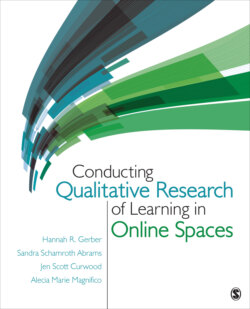Conducting Qualitative Research of Learning in Online Spaces

Реклама. ООО «ЛитРес», ИНН: 7719571260.
Оглавление
Hannah R. Gerber. Conducting Qualitative Research of Learning in Online Spaces
Conducting Qualitative Research of Learning in Online Spaces
Brief Contents
Detailed Contents
List of Figures, Tables, and Spotlight Boxes. Figures
Tables
Spotlight Boxes
Foreword. Conducting Qualitative Research in the Moment
References
Preface
The Structure of This Book
Acknowledgments
Authors’ Note
About the Authors
Chapter One How Can Learning in Online Spaces Be Informed by Qualitative Research? Guiding Questions for Chapter 1
Introduction
Mediated Spaces and Online Learning
Making Pragmatic Choices About Methods
Choosing Among Qualitative Traditions
Qualitative Approaches
Case Study
Ethnography
Grounded Theory
Phenomenology
Participatory Approaches
Research Paradigms and Philosophical Stances in a Study’s Design
Pragmatic Research and Remix: Considering Multimethod Approaches
Remix
Conclusion
Connecting to Your Work
Chapter Two What Kinds of Online Spaces Exist? Guiding Questions for Chapter 2
Introduction
Conceptualizing Online Spaces as Field Sites
Spotlight Box 2.1. Programming, Designing, and Learning With Scratch
Defining the Field Site
Understanding Networked Field Sites
Spotlight Box 2.2. The Hunger Games and Literacy
Learning in Social Networking Forums
Layers of Learning in Formal Learning Spaces
Mapping Networked Field Sites
Spotlight Box 2.3. Living and Learning With New Media
Conclusion
Connecting to Your Work
Chapter Three How Do We Conceptualize Learning in Online Spaces? Guiding Questions for Chapter 3
Introduction
Using Learning Theory as a Tool for Research Design
Complementary and Contradictory Theories of Learning
Theories of Learning
Behaviorist Theories of Learning
Spotlight Box 3.1. Class Dojo
Cognitive and Sociocognitive Theories of Learning
Sociocultural Theories of Learning
Spotlight Box 3.2. Scholar
Learning in Online Spaces
Participatory Cultures
Affinity Spaces
Connected Learning
Conclusion
Connecting to Your Work
Chapter Four What Does It Mean to Be a Qualitative Researcher of Online Spaces? Guiding Questions for Chapter 4
Introduction
Aspects of Researching Online Meaning Making
Being a Qualitative Researcher of Online Spaces
Offline Environments
Spotlight Box 4.1. Investigating Collaboration In and Beyond Minecraft
Online Interaction
Movement and Artifacts
Spotlight Box 4.2. Facebook as a “Transliteracy Bridge”
Positioning the Researcher as a Research Tool
Researcher Positioning in Online Settings
Spotlight Box 4.3. Researching Meaning Making in Barnsborough
Ethical Considerations
Designing Research Questions
Conclusion
Connecting to Your Work
Chapter Five What Methodological Tools Are Available for Data Collection? Guiding Questions for Chapter 5
Introduction
Establishing Trustworthiness
Credibility
Transferability
Dependability
Confirmability
Trustworthiness and Analytic Openness
Data Sources
Sampling
Observation
Spotlight Box 5.1. Using Blogs as Electronic Field Notes
Interviews
Spotlight Box 5.2. Online Interviews, From Instant Messages to Social Media
Surveys
Artifacts
Spotlight Box 5.3. Capturing Dynamic Learning With Stimulated Recall
Conclusion
Connecting to Your Work
Chapter Six What Analytical Approaches Are Available for Data Analysis? Guiding Questions for Chapter 6
Introduction
Moving From Data Collection to Analysis
Considering Data Analysis in Networked Field Sites
Thematic Analysis
Grounded Theory Analysis
Spotlight Box 6.1. Figment as a Multi-Sited Writing Space
Discourse Analysis
Spotlight Box 6.2. Black’s Discourse Analysis Work on Fanfiction.net
Multimodal Analysis and Artifactual Analysis
Spotlight Box 6.3. Multimodal Microanalysis
Innovation With Methods
Conclusion
Connecting to Your Work
Chapter Seven What Is Ethical Research? Guiding Questions for Chapter 7
Introduction
Research Ethics and Policies Across Multiple Contexts
The Public Versus the Private Web
Spotlight Box 7.1. Analyzing the Ethics of Researching OnlineSocial Networks: Public, Private, Continuum?
Review Boards and Research Approval
Do No Harm
Spotlight Box 7.2. Do No Harm and World of Warcraft: Chat Log Analysis to Protect Nonparticipants
Informed Consent
Anonymity
Benefits and Risk
Spotlight Box 7.3. Pro Bono Professional Development and Game-Based Learning
Copyright, Terms of Service, End-User License Agreements, Creative Commons, and Fair Use
Conclusion
Connecting to Your Work
Chapter Eight How Might Research Change in New Times? Guiding Questions for Chapter 8
Introduction
The Complicated Nature of Studying Learning in Online Spaces
(Re)Imagining Research Techniques
Shifting Cultures, Shifting Boundaries
Conclusion
Connecting to Your Work
Glossary
References
Index
Отрывок из книги
For my parents, who instilled in me a love for inquiry.
For my children, who help me to see the world through ever-changing perspectives.
.....
Though not an established tradition, and often combined with aforementioned approaches, participatory research is used by researchers who wish to privilege participant voices, reduce researcher bias, and engage in “translocal” understanding (Burnett, Davies, Merchant, & Rowsell, 2014). Rooted in a nonconforming perspective of research design (Johnson & Onwuegbuzie, 2004), participatory learning encourages participants to be part of the research, from its conceptualization to the dissemination of findings. Some researchers have suggested that participatory approaches are crucial for overturning power dynamics inherent in traditional research approaches (Bergold & Thomas, 2012; Morrell, 2006; Onwuegbuzie & Frels, 2013).
Researchers using participatory approaches often strive to empower underrepresented, underserved, marginalized, or oppressed individuals and groups. For instance, when Michelle Fine and colleagues (2005) engaged in an “ethnographic analysis of the political economy of schooling as lived by youth in and around the New York City metropolitan area” (p. 500), they purposely included youth researchers who “played a vital role in determining the research design, questions, methods, interpretations and products” of the study (p. 501). In so doing, they found that the youth-as-researchers developed critical stances related to racism and social justice. Fine and colleagues featured some of the youth researchers’ reflections and discoveries, such as, “I used to see flat. No more... now I know things are much deeper than they appear. And it’s my job to find out what’s behind the so-called facts. I can’t see flat anymore” (p. 523). This suggests that participatory research could inspire a critical awakening among youth-as-researchers.
.....